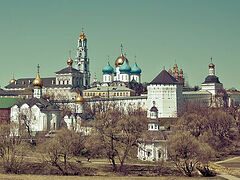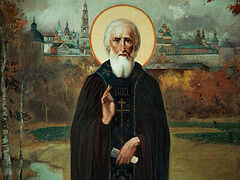Alexei, a talented young man, a teacher and post-graduate student of the Moscow State Institute of International Relations, was completing his thesis on economic theory when he suddenly understood that he was unable to read. Though he had had vision problems since school, the doctors now detected progressive optic nerve atrophy in both eyes—his large, green almond-shaped eyes with very light, fluffy lashes. The optic nerves had become inflamed at the crossing, deep in the brain, in the area where neurosurgical interventions are only possible in extreme cases because after such kinds of surgery patients have to learn to speak and do other basic things from scratch.
Thus my husband went blind. Though that autumn he was still my boyfriend. Half a year before those events he had blurted out that we had been in a serious relationship that would most probably lead to marriage. In essence, it had been his proposal of marriage. But back then I was still unsure whether we were meant for each other, so I kept asking God to reveal us His will and show us the right decision in a very obvious way.
At that time I was improving my journalistic and driving skills: I would drive families with small children whom I knew to their dachas1, deliver clothes and food to those in need around the city, and sometimes take priests to dying people’s homes. My work allowed me to combine necessary and unavoidable tasks with important and useful ones. And it just happened that I took it on myself to transport Alexei to and from hospitals. Soon even his family and friends started asking me about Alexei’s health and needs. So I ended up in the role of his fiancée de facto.
Fortunately the diagnosis of multiple sclerosis was not confirmed—the other possible diagnoses seemed far less scary. However, the doctors’ prognoses were bleak: None of them were saying that his eyesight would ever return and the capacity for distinguishing light and shade seemed “a great achievement.” Meanwhile, at night Alexei would dream about reading because he had always had a book in his hand since age four. We were confronted with a disease that was not even treated abroad. One international medical center recommended Alexei go to a neurologic clinic regularly for three years for the stimulation of his nervous system—hormones, IV therapy, eye injections, drops, leeches and other unpleasant procedures.
At some point I realized I knew a solution. I understood that the Lord had already answered my prayer and I just couldn’t leave the person who had lost his sight and who was holding tight to my hand. It was neither pity, nor sacrifice, nor passion—actually it is hard for me to describe what was happening inside me. I only remember that strong feeling that I just couldn’t do otherwise…
 Photo by Sergei Vlasov. Patriarchia.ru
Photo by Sergei Vlasov. Patriarchia.ru
Once, when we were expecting our first baby, our friend Vladimir Strelov told us about Hierodeacon Moses from the Holy Trinity—St. Sergius Lavra who was an ophthalmologist by profession, Ph.D in Medicine, and received patients at the Lavra’s medical department.2 Taking his case history, Alexei and Vladimir travelled to the Lavra together to consult this monk-doctor and pray to St. Sergius. Alexei returned home inspired, though we had learned to live with blindness by that time, writing articles together and reading aloud together.
It was the beginning of Great Lent, and Alexei decided to follow Fr. Moses’ advice and take Communion weekly. I also remember us going to the Theophany Cathedral at Elokhovo, to the relics of his patron-saint—Holy Hierarch Alexei of Moscow (a friend of St. Sergius of Radonezh). At a chemist’s we bought some tinctures and made infusions from lemongrass root on Fr. Moses’ advice.
In May, after Pascha, his condition began to improve. Alexei was afraid to believe it, but in September even ophthalmologists in an outpatients’ clinic confirmed that fact. First they thought that Alexei had gone mad and learned the eye test chart by heart. After all, he wasn’t supposed to see anything: the nerve cells were dead and couldn’t transmit signals to the brain. But he could see somehow! With visual acuity at fifty percent, not even five percent!
I realized I must go to the Lavra with our newborn daughter to give thanks for the miracle despite the long journey. Above all I needed to thank Fr. Moses. But how should I do it properly? The search for an answer to that question wasn’t easy.
It is actually quite terrifying when a miracle occurs. As though, while walking along the road, complaining and pitying yourself as usual, you lifted up your eyes and saw God in front of you. The loving eyes, the warmth of His presence, and the wounds on His body… Now you can’t pretend the whole thing was just a dream, your fantasy, or invention. It’s hard to describe the reality that unfolds from faith, which is the most important miracle. Even the saints can’t explain this well. As outsiders we marvel—how can a wonderworker be filled with remorse if he is a saint who has no sins and is heard by God? But your life after Divine intervention, when Divine love runs through your bones, assumes a new dimension—eternity. Hence this fear: You see that in this dimension nothing can continue in the usual manner…
Before leaving for the Lavra we had considered various possibilities emotionally and were even ready to sell or give away our possessions—if only they would tell us at the Lavra how we could repay their kindness after the extraordinary miracle we had experienced! But Fr. Moses’ brief answer astounded us. He said: “Please come whenever you can. Keep the commandments. It is so nice in the Lavra; St. Sergius sorts everything out here, so I have nothing to do with this. Thank him. As we all live here, we just observe his miracles.” And he shared some other miraculous stories with us, which were no less wonderful.
We hurried to share the story of Alexei’s miraculous healing with all our friends, both believers and those with weak faith. I remember the message we sent out, and the elation we received in response. In the preceding months, no one had been indifferent: people had sympathized with us and offered us help. Our religious friends lined up, eager to go to the Lavra with us and meet Fr. Moses. And non-religious friends, though they explained everything by Alexei’s young age and the effect of lemongrass root, called Fr. Moses a wise specialist and cursed the national health care system. As for us, we felt like we were inside the Gospel and found that what was more painful was when people seeing see not (Mt. 13:13).
Seventeen years have passed since then. Now we have four children. Our eldest daughter is finishing school soon, and we named our youngest son Sergei after St. Sergius. We work, study, travel, and have friends—like everybody else. Our love and faith are often tested; but as we look back on our life, we marvel at the Lord’s mercy and patience. And we give thanks to Him not only for the miracle of the restored eyesight but also for the Lavra and St. Sergius (both have since become so close to us), for the monk with whom we became friends, and for our family.





